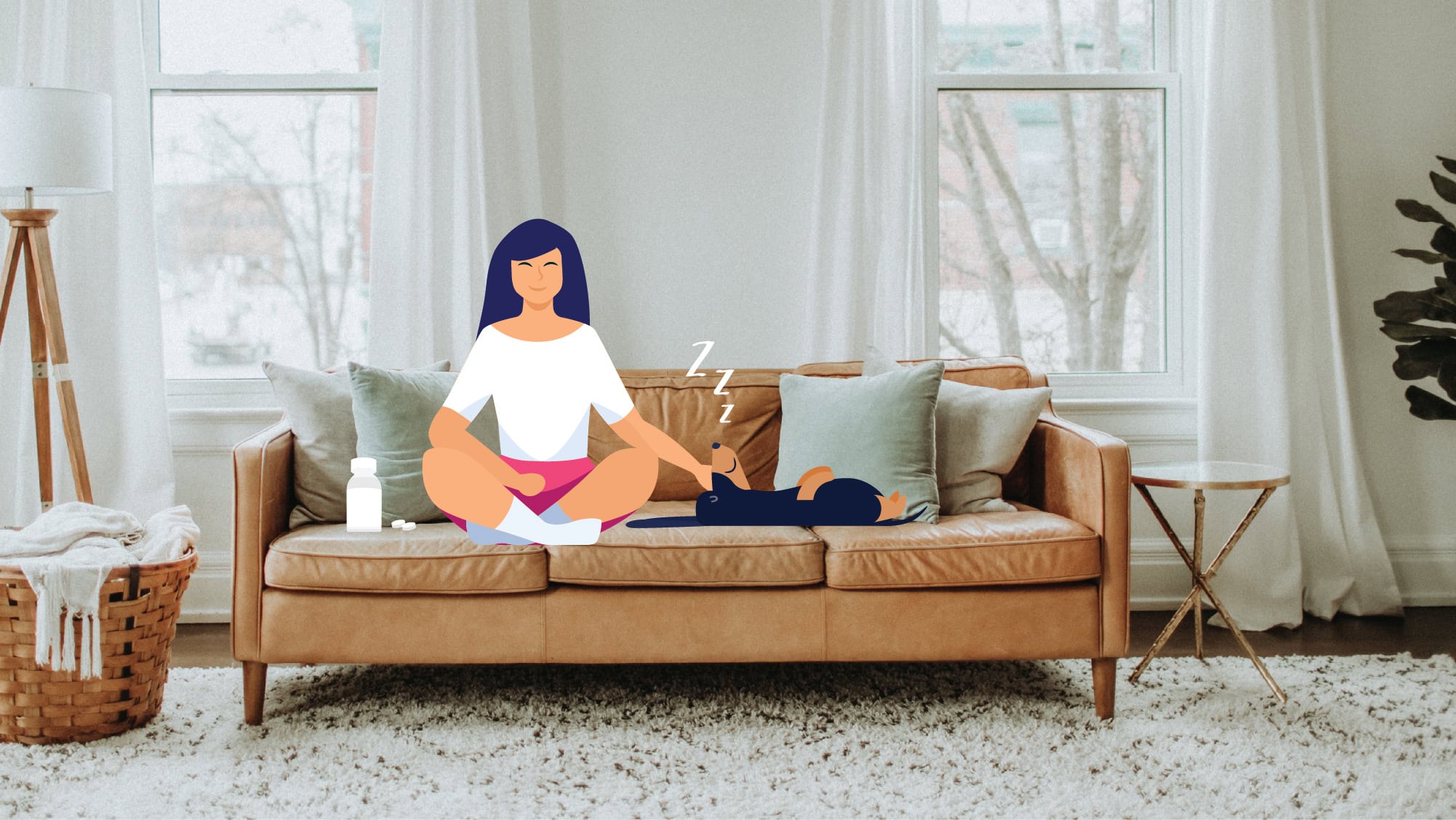Did you know on average a dog should sleep for around ten to fourteen hours a day? Your dog will usually break this sleep up into a few naps and one extended sleep session during the nighttime.
Sleep is important for dogs as it lets them rest, grow or repair their tissues, and process the day. Just like humans, dogs have different stages of the sleep cycle including slow-wave sleep and REM sleep.
When we as humans do not get enough sleep it can impact how well we function the next day. So do dogs also suffer from sleep deficits as well? It’s thought so.
In people, sleeping pills are commonly used to help with sleep disorders. Sleeping pills for dogs tend not to be our first line of treatment as there are other ways we can help our dog get a good night’s rest.
My dog isn’t sleeping well
There can be many reasons for your dog not sleeping well. Reasons include medical and behavioral causes. Whilst it can be tempting to think that sleeping pills can solve your dog’s issues instantly, it’s not as easy as that. Medications can mask the signs of underlying issues and act as more of a sedative than a true sleeping aid.
Common reasons for lack of sleep in dogs:
Anxiety
Anxiety is on the rise in dogs and can lead to sleepless nights for pet parents and their dogs. Anxiety relating to stress, adverse weather such as thunderstorms, or separation anxiety can cause loss of sleep, pacing, whining, and destructive behavior.
Cognitive decline
Older dogs can suffer senior moments and forget who or where they are, which can be unsettling in the middle of the night when there is no one around. Try keeping your senior dog in the same room as you to offer comfort when they wake up or leave a radio on quietly for comfort if they sleep separately from you. Cognitive decline in senior dogs can be rapid, and few treatments are available. Certain prescription foods and medications are available, so talk to your veterinarian for more advice.
Medical causes.
Your dog may not be able to sleep well because they are in pain. To learn more about pain in dogs, read our blog. examples of painful conditions that affect sleep include osteoarthritis, ear or skin infections, and urine scalding from incontinence. These conditions can be treated with medications letting your dog sleep better. Book a health check with a veterinarian today.
Sleeping pills for dogs
It’s crucial not to give your dog any kind of medication, but especially sleeping tablets to your dog without talking to a veterinarian. Sleeping tablets are very powerful and an overdose can be fatal if not treated urgently. If your dog has been given human sleeping tablets talk to a veterinarian straight away.
Tips to help your dog sleep well:
Physical activity
Dogs need physical and mental activity. A dog who has lots of pent-up energy will not sleep well at night. Take your dog for a long walk each day, and try to vary the route and pace for mental stimulation. Allowing your dog to sniff on walks them to use their brains on walks.
Rotate their toys regularly to reduce boredom. Pull a few out of the toy chest each week and hide the other ones away. Your dog will get excited when they are next brought out to play. Puzzle toys such as Kongs, wobble feeders, or lick mats can provide hours of entertainment. Your dog doesn’t have to be racing around to feel tiered, toys and games can help with this.
Toileting
Make sure you let your dog out at night before you go to sleep for a toilet break. They should defecate and urinate at least once in the evening. This will allow your dog to comfortably last through the night without needing to get up for a toilet break. If they are a younger puppy under 5-6 months they will still need to be let out during the night for a toilet break.
Safe sleeping place
Your dog needs a comfortable bed, away from drafts and if near a window, with curtains that can be closed to keep out the sunlight. Place the bed in a quiet area and add a t-shirt that smells like you for comfort.
Pheromone diffusers
Pheromone diffusers work well for dogs with low-level anxiety. They are available as plug-in diffusers, collars, or sprays. These dog appeasing pheromones help your dog to feel relaxed and more settled, thus allowing them to sleep.
Calming supplements
Calming supplements offer a natural way to supplement your dog with vitamins, amino acids, and minerals that can help promote relaxation. They need to be given daily but can help with sleeping issues related to stress.
FAQ
Can you get dog sleeping tablets for traveling?
A veterinarian can prescribe dog sleeping tablets for traveling. Your dog may also find using pheromone sprays or anti-nausea medication helpful in combination with sleeping tablets.
Can dogs die from sleeping tablets?
Human sleeping tablets can be very toxic to dogs in certain doses. If you have fed your dog human sleeping tablets call the Pet Poison Helpline or a veterinarian immediately. If treated early enough, we are often able to make dogs sick, thus avoiding complications from sleeping tablets.
What sleeping pills work in dogs?
Veterinary prescription medication to aid in sleeping or reduction in stress includes acepromazine, fluoxetine, gabapentin, and trazodone as oral medications. Your veterinarian will also have injectable medication that can be given as sedatives in an emergency situation.
If your dog isn’t sleeping at night, sleeping pills are not the first line of treatment that would be recommended by a veterinarian. There are many simple ideas to try first, and if you are still having issues you may need to work with a veterinary behaviorist to resolve your dog’s issues. They can prescribe dog sedatives but this is in combination with training and behavior modification.





